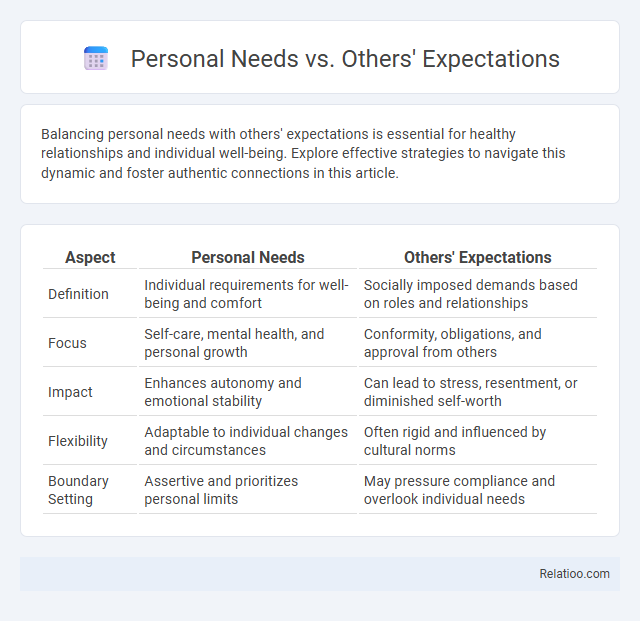Balancing personal needs with others' expectations is essential for healthy relationships and individual well-being. Explore effective strategies to navigate this dynamic and foster authentic connections in this article.
Table of Comparison
| Aspect | Personal Needs | Others' Expectations |
|---|---|---|
| Definition | Individual requirements for well-being and comfort | Socially imposed demands based on roles and relationships |
| Focus | Self-care, mental health, and personal growth | Conformity, obligations, and approval from others |
| Impact | Enhances autonomy and emotional stability | Can lead to stress, resentment, or diminished self-worth |
| Flexibility | Adaptable to individual changes and circumstances | Often rigid and influenced by cultural norms |
| Boundary Setting | Assertive and prioritizes personal limits | May pressure compliance and overlook individual needs |
Understanding Personal Needs
Understanding your personal needs is essential for maintaining mental and emotional well-being amid external pressures and others' expectations. Prioritizing self-awareness helps you identify what truly matters to your happiness and fulfillment, reducing the impact of societal or familial demands. Clear recognition of personal needs empowers you to set healthy boundaries and make decisions aligned with your authentic self.
Defining Others’ Expectations
Others' expectations are external standards imposed by family, friends, or society, often reflecting cultural norms, social roles, or professional obligations. These expectations shape behavior by creating implicit or explicit demands that influence decision-making and prioritization. Understanding and defining these expectations requires recognizing their source, purpose, and impact on individual autonomy and well-being.
The Roots of Societal Pressure
Societal pressure stems largely from deeply ingrained cultural norms and collective expectations that dictate acceptable behavior and life choices, often at odds with personal needs. These pressures manifest through family, media, and institutional standards, shaping individuals' decisions to conform for social acceptance. Understanding these roots is essential to navigate and balance personal aspirations with external demands effectively.
Balancing Self-Fulfillment and External Demands
Balancing personal needs with others' expectations and external pressure requires clear prioritization of self-fulfillment to maintain emotional well-being and mental health. Establishing boundaries and cultivating assertive communication enables individuals to honor their values while managing demands from family, work, and society. Effective time management and self-awareness are essential strategies to navigate conflicting obligations without compromising personal growth and happiness.
The Impact of Ignoring Personal Needs
Ignoring Your personal needs in favor of others' expectations or external pressure can lead to increased stress, burnout, and diminished mental health. When you consistently prioritize external demands over self-care, it undermines long-term well-being and personal fulfillment. This imbalance often results in decreased productivity and strained relationships, highlighting the critical importance of addressing Your needs proactively.
Recognizing Unhealthy Expectations
Unhealthy expectations often manifest when personal needs are consistently sidelined to satisfy others' demands or societal pressures, leading to stress and emotional exhaustion. Recognizing these harmful expectations involves identifying when obligations compromise well-being or hinder authentic self-expression. Setting boundaries and prioritizing self-awareness helps distinguish genuine responsibilities from imposed pressures, fostering healthier relationships and mental health.
Strategies for Assertive Communication
Balancing personal needs with others' expectations and external pressure requires assertive communication strategies such as clear boundary setting, using "I" statements to express feelings and needs, and maintaining calm yet firm body language. Prioritizing self-awareness helps identify when to say no or negotiate compromises without guilt, ensuring respect for both oneself and others. Effective assertiveness reduces stress by preventing misunderstandings and fostering mutual respect in interpersonal interactions.
Cultivating Self-Awareness
Cultivating self-awareness helps you distinguish between your personal needs and the expectations imposed by others, enabling clearer decision-making aligned with your values. By recognizing external pressures, you can better manage stress and avoid compromising your well-being. Developing this skill fosters emotional resilience and authentic self-expression in challenging social dynamics.
Building Healthy Boundaries
Balancing your personal needs with others' expectations requires clear communication and assertiveness to establish healthy boundaries. Setting limits protects your well-being and prevents external pressures from overwhelming your decision-making. Consistently reinforcing these boundaries fosters respect and promotes mutual understanding in relationships.
Achieving Harmony Between Self and Society
Balancing personal needs with others' expectations requires mindful prioritization and clear communication to ensure authentic self-expression while respecting social norms. Navigating societal pressures involves developing resilience and setting boundaries that protect mental health without isolating oneself from community support. Achieving harmony between self and society fosters mutual understanding and collaboration, promoting well-being and social cohesion.

Infographic: Personal Needs vs Others’ Expectations
 relatioo.com
relatioo.com